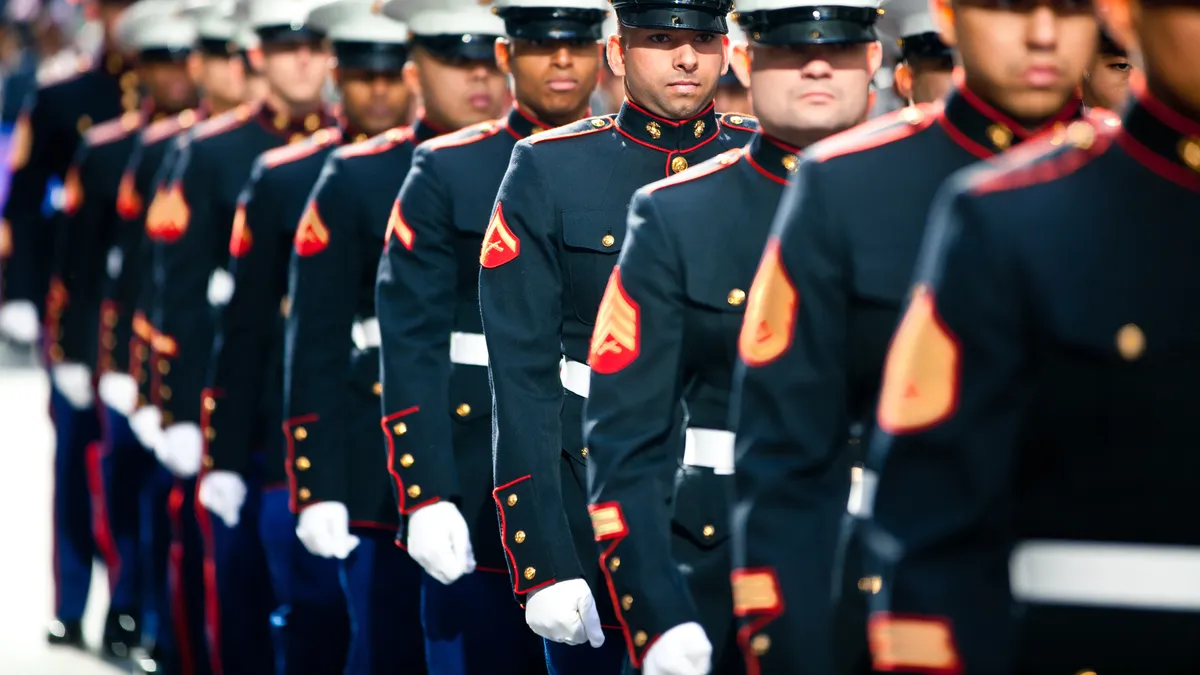Dive Brief:
- Amazon Web Services (AWS), the U.S. Marine Corps and Northern Virginia Community College (NOVA) are teaming up to develop a set of data intelligence training courses for Marines, according to NOVA.
- Offered through NOVA and billed as a "non-traditional (military) training solution," the courses cover topics such as cloud computing and artificial intelligence (AI). They also will be available to all students and count toward an associate degree in information systems technology.
- The news follows the recent launch of a bachelor's degree in cloud computing from AWS Educate, NOVA and George Mason University, and it reflects growth in Amazon's cloud platform as a conduit for technology training at community colleges.
Dive Insight:
For the Marine Corps, the NOVA partnership represents a shift in how training is typically offered. Although it has historically been delivered by the military at their installations, the need for data skills and the opportunity for service members to earn college credit for the work pushed Marines to work with NOVA.
"We've already got structures in place, and (the Marine Corps) saw the value of not having to reinvent something that already existed at a local entity" that it had worked with before, said Chad Knights, NOVA's provost of information and engineering technologies.
For NOVA, in turn, there was a chance to innovate knowing the courses would have takers. The program also includes the first machine learning and AI courses developed in Virginia's community colleges system.
"Any time you launch a new program, there's a concern you won't have a student body," Knights said. "This has enabled us to stand up a very organized program where we know we're going to have students, because we'll have Marines coming in to take the course."
Previously, Knights added, NOVA would offer prior learning credits for service members' military training. In this case, NOVA mapped the skills and knowledge Marines would be required to learn directly into the courses. "Sometimes that credit for prior learning is not as easily transferable as the actual credit course," he said.
Marines will complete 31 credits at NOVA and cap off their instruction with a course offered by the Marine Corps. The program structure sets up Marines to return to NOVA to complete a full degree and also offers skills that can parlay into higher-level military and civilian jobs.
Its "blend of academic instruction, commercial courses and internships, and traditional military training represents the future of Marine Corps intelligence training," Col. Randy Pugh said in the announcement.
The Marine Corps is looking into scaling the partnership to related fields and could more fully integrate the concept into its training, according to the announcement. That would likely require making such programs available online, Knights said.
NOVA is working to build transfer pathways for the program with local institutions, including George Mason and The George Washington University, so students can put the credits toward a four-year degree, Knights said.
AWS Educate, meanwhile, is bringing cloud computing programs, from certificates to four-year degrees, to a growing number of institutions. Community colleges are proving critical to that approach.
The company sees them as "a flywheel for changing the face of education" because of their ties to high schools, four-year institutions and the workforce, Ken Eisner, director of worldwide education programs at AWS, told Education Dive. "They become a great lever to truly create long-term pathways for students into cloud careers."
Knights said he views AWS Educate as "an enabler" for its cloud curriculum, offering tools and industry perspective on the skills graduates need. It is a strong local employer. Although many of the foundational skills learned are program-agnostic, Knights said, the curriculum has students using AWS Educate Classrooms for hands-on learning.
In addition to Amazon, tech firms like Google, Facebook and Apple have been working with colleges to develop technology curriculum.
Martha Parham, senior vice president for public relations at the American Association of Community Colleges, is optimistic about the relationships. "As tech changes at kind of an exponential rate, these partners make it possible to offer these types of courses," she said.














